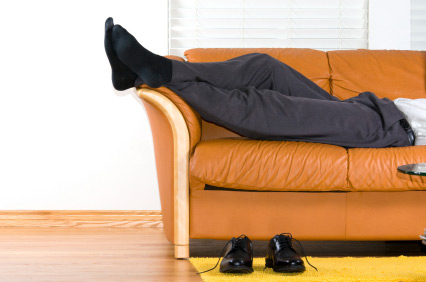| Daytime Sleepiness |
| HOME :: DAYTIME SLEEPINESS |
| |
 People who experience daytime sleepiness, also called hypersomnia, may find themselves falling asleep at any time - at work or while driving - and suffering from a lack of energy or inability to think clearly. In fact, according to the National Sleep Foundation, up to 40% of people experience daytime sleepiness at some point.
People who experience daytime sleepiness, also called hypersomnia, may find themselves falling asleep at any time - at work or while driving - and suffering from a lack of energy or inability to think clearly. In fact, according to the National Sleep Foundation, up to 40% of people experience daytime sleepiness at some point.
It's not sleep deprivation, it's a sleep disorder.
Excessive Daytime Sleepiness (EDS) is not caused by sleep deprivation alone. If you feel tired or sluggish during the day because you are not getting a normal amount of sleep, you do not have EDS. EDS is usually caused by a physical condition such as:
- A tumor, head trauma or injury to the central nervous system
- Another sleep disorder such as narcolepsy or sleep apnea
- Medicines such as tranquilizers and sleeping pills
- Drug or alcohol abuse
- Heredity
- Withdrawal from caffeine, alcohol, or stimulants
- Medical conditions including multiple sclerosis, depression, encephalitis, epilepsy, or obesity may contribute to the disorder
- Sometimes there is no known cause
Symptoms
EDS is most common in teenagers and young adults, with
these symptoms:
- Constant sleepiness
- Frequent napping
- Long nighttime sleeping
- Irritability
- Mild depression
- Memory loss
- Lack of concentration
People with this disorder may feel frustrated and angry because others think they are lazy or uninterested. EDS may also cause problems in school or in the workplace and with family and friends.
Diagnosis
If you sleep poorly for a month or more, or if you find sleepiness during the day interferes with normal tasks, see your doctor. You may be asked to visit a sleep center so your sleep can be monitored.
The most common test for EDS is a painless sleep study, also called a polysomnogram. Click here to learn more.
Treatment
Treatment varies, depending on what causing the EDS. If a medical condition is at the root of the sleep disorder, treating the medical condition may take care of it. If it is caused by medicines, your dosage or prescription may be adjusted.
How sleepy are you, your spouse, your friend or your child?
Take this questionnaire to determine the level of sleepiness.
|
|



